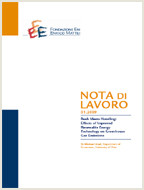Safe vs. Fair: A Formidable Trade-off in Tackling Climate Change

27.06.2011
Massimo Tavoni, Shoibal Chakravarty, Robert Socolow
Q01, Q56
Climate Policy, Burden Sharing, Negative Emissions
Climate Change and Sustainable Development
Carlo Carraro
Global warming requires a response characterized by forward-looking management of atmospheric carbon and respect for ethical principles. Both safety and fairness must be pursued, and there are severe trade-offs as these are intertwined by the limited headroom for additional atmospheric CO2 emissions. This paper provides a simple numerical mapping at the aggregated level of developed vs. developing countries in which safety and fairness are formulated in terms of cumulative emissions and cumulative per capita emissions respectively. It becomes evident that safety and fairness cannot be achieved simultaneously for strict definitions of both. The paper further posits potential global trading in future cumulative emissions budgets in a world where financial transactions compensate for physical emissions: the safe vs. fair trade-off is less severe but remains formidable. Finally, we explore very large deployments of engineered carbon sinks and show that roughly 1000 GtCO2 of cumulative negative emissions over the century are required to have a significant effect, a remarkable scale of deployment. We also identify the unexplored issue of how such sinks might be treated in sub-global carbon accounting.
***
Suggested citation: Tavoni M, Chakravarty S, Socolow R. Safe vs. Fair: A Formidable Trade-off in Tackling Climate Change. Sustainability. 2012; 4(2):210-226,
http://dx.doi.org/10.3390/su4020210.
